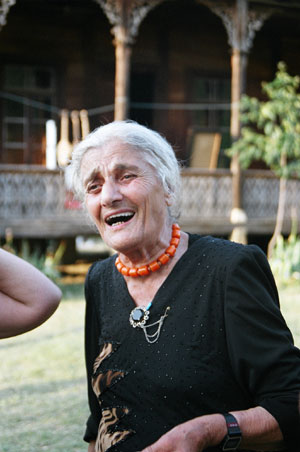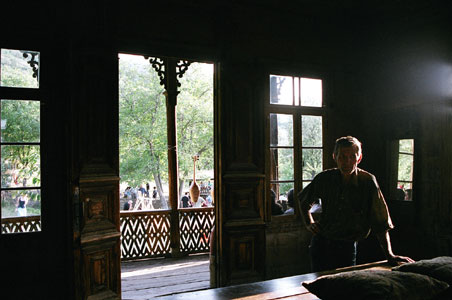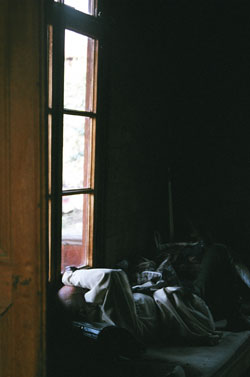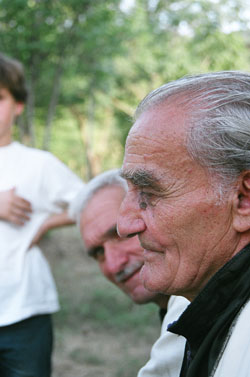When I walked out in front,
a man selling pandurebi (fretted, three-stringed lutes) that he had
made was demonstrating his wares by playing and singing a song, with this
woman singing along with him (I later learned her name from Carl).

Natela Rogava; July
23rd, 2006
It happened to
be a song I knew, so I joined in. A couple of other people immediately walked
over, interested in the spectacle of a foreign girl singing their folksongs;
one woman asked a few questions about who I was and what I was doing in the
country, and then said "You have to meet my friends, I have friends here
who sing together!" and took me by the arm and led me a few meters over
to where a group of people sat eating on the grass. Three of the women I eventually
recorded were there that evening: Nino Sanik'idze, whose English was flawless
and who became my main contact; Tamuna Iashvili, a professional classical
operatically trained singer who teaches voice studies at the Conservatory
("Say that I hate it!" she told me, only half joking) and whose
sister, who was also there, is named Vera; and Marik'o Zarkua, whose children
were running all over, and at whose house we finally all met together. The
woman who introduced me to them, whose name I never learned, stuck around
for a little as, with a couple of introductory sentences, we began finding
repertoire that we all knew and singing together (the first song, I think,
that we settled on was the Kakhetian chant Shen Khar Venakhi (You
are a vineyard)).
It soon emerged
that the whole group I was sitting with were internally displaced persons
(IDPS) from the disputedly Georgian province of Abkhazia. Abkhazia is in the
northwestern corner of Georgia; it borders on Russia, and many Abkhazians
consider themselves more Russian than Georgian. The province has been fighting
for independence from the central Georgian government for a very long time,
with aid and abettance by Russia; most recently, Russia announced that it
would issue Russian passports to any Abkhazians who wanted them, and many
people have accepted the offer. The violence in Abhazia has resulted in much
tragedy, not the least of which is the internal displacement of thousands
of refugees from the fighting. Nino, Tamuna, Marik'o and Tamrik'o Alpenidze
(the fourth lady, who sings bani), together with much of their families,
are four such IDPs. (Nino referred to her three singing mates as her gogoebi,
girls; I thought of them as the Abkhaz ladies.) They all left Abkhazia in
1993, during a week-long ceasefire. Nino and Tamuna knew each other already;
their mothers taught music together at a school in Sukhumi, the capital of
the region, so they've sung together since childhood. These two met Marik'o
and Tamrik'o in Tbilisi, other members of the community of internally displaced
persons from Abkhazia. All four women are in their late twenties and thirties;
I believe that Tamrik'o is the only unmarried one, but I'm not sure.
These four began
to sing together for pleasure, and have never attempted to do so professionally.
They already had a fairly large common repertoire, of folksongs from all over
Georgia as well as Russian and Abkhazia; together they began to learn chants,
galoba, from printed music that a Telavi (city about two and a half
hours southeast of Tbilisi) archive made public some time ago. Marik'o had
previously been the only one who chanted in a church, but the four of them
decided two years ago that they wanted to go to old, broken-down or destroyed
(under the Communists) churches and chant there, "because it's a good
thing to do." So they began to take car trips to such churches, and chanted
there. It was unclear whether or not they had an audience, but the churches
were not in use. However, in Easter of 2005, this came to an end when the
friend driving them home on an unfamiliar road at night flipped the car, breaking
Tamrik'o's arm and Tamuna's leg. They told me, resoloutely, that they're planning
to start doing it again soon.
For three weeks,
Nino and I called each other and tried to plan a meeting, but the times never
quite worked out. Finally, on the very last afternoon of my stay in Georgia,
the four women picked me up from my apartment and we drove through the mountains
for an hour out of Tbilisi until we reached K'ojori village. Marik'o had moved
into a new house there the night before; it was a warm, sunny area with packed-earth
roads, houses made out of cement and yards fenced in with wire. I got the
strong impression, but did not ask to confirm it, that this was a community
of Georgian IDPs from Abkhazia. The house was full of clutter and people,
twenty-five at least. Marik'o apologized (of course) for the inevitable mess,
and everybody bustled out into the yard, where a table was set up and food
and drink speedily produced to cover it. The alcohol was beer (ludi)
instead of wine; I noticed all through my trip that women seem to prefer beer
when drinking casually, perhaps because it is not associated with the male-dominated
rituals of wine toasting. With beer, you toast your enemies! The yard filled
with children and women, some sitting around the table, some along the side
of the house. We set to the food, and the ladies explained that they wanted
to rehearse first, because they hadn't sung together in a bit and then I could
pick songs I liked and we could record them. This rehearsal lasted nearly
three glorious hours. The women and children were quiet at first as they listened,
but eventually began to participate in the music, which seemed familiar to
everyone present, boys and all. One tall, tomboyish girl named Ana, with an
infectious smile and easy grace, was pointed out to me as the tennis champion
of Georgia; near the end of the "rehearsal" she shyly began an Abkhazian
song that my four ladies had forgotten the words to, and everybody joined
in.
The women sang
through a dazzling array of songs, beginning with many religious chants
and continuing through a wide variety of origins, incuding Ach'arian,
Gurian, Kakhetian, Abkhaz, and even Russian songs. For the chants, they
tuned their "a" from
someone's mobile phone. Nino said that it's not quite A440, but a little
bit lower. This makes a very nice and comfortable register to sing in,
according to Tamuna. They sing the chants from sheet music, but I didn't
see them use it or a pitch to tune to in any secular songs. Certainly they
adjust the register of a song as needed for comfort.
I asked them a
few times to sing Abkhazuri songs for me, fascinated by the possibility of
hearing some (I'd never heard Abkhaz music before, as it continues to be a
controversial element of Georgian culture and Georgian political boundaries)
but they were reluctant to do so. In the end I only recorded two Abkhazuri
songs: Simghera k'ldeze
("song about a rock", a lament for a fallen soldier) and a song
simply called Samshoblis Simghera,
or "song of the homeland". The ladies said that they had forgotten
the words to many Abkhaz songs, implying that they didn't sing them often.
I thought then that this reluctance might have been a result of painful memories
of home; Carl's correction to my mistake about their ethnicity (that they
were Georgians living in Abkhazia, rather than Abkhazians proper) points to
the far more logical conclusion that Abkhazian songs were not a part of their
own traditions. This does not, however, diminish the pain and frustration
that many internally displaced persons from that region feel when they are
forced out of their homes and into the somewhat reluctant arms of their official
compatriots. Nino, who worked in Tbilisi for an organization concerned with
internally displaced persons from Abkhazia, said quietly in the car alone
with me as she drove me home that "Even now, thirteen years later, we
are still not welcome." Welcoming guests can be less complicated in Georgia
than welcoming Georgians whose identities as Georgians and political loyalties
are mixed, uncertain or potentially divided.
To my profound
regret, I do not have any photos of Nino, Tamuna, Tamrik'o or Marik'o. My
camera had broken a few days before. They and the children took some snapshots,
the afternoon we recorded, of me and them together, but so far I have not
seen them. Their voices must, for now, serve to give you an idea of what they're
like. Tamrik'o is the bani in every song; Tamuna's voice is distinctive for
its breath control and vibrato. Of the other two, Nino's slightly quieter
and lighter voice generally takes a sure top or middle part, while Marik'o
occasionally joines Tamrik'o on bani. The Russian song we recorded
is a very famous one, recorded by (among others) the Russian Red Army Chorus,
called Beryozonka
and is about a birch tree. A particularly characteristic Guruli sagalobeli
(Gurian chant/praise song) is the following
Gadidebt shen ghvtis mshobelo. Throughout,
these ladies' musicality and deep love of each other and what they make together
is evident. I hope to sing with them, whenever I can return.




